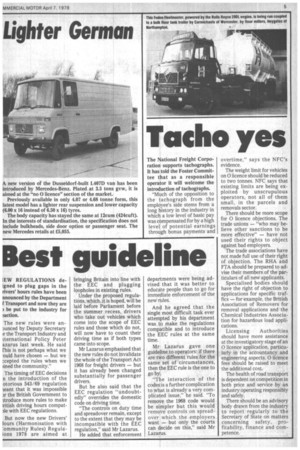Best guideline
Page 7

If you've noticed an error in this article please click here to report it so we can fix it.
IEW REGULATIONS deigned to plug gaps in the rivers' hours rules have been nnounced by the Department I' Transport and now they are be put to the industry for ,!action.
The new rules were anpunced by Deputy Secretary 1r the Transport Industry and iternational Policy Peter azarus last week. He said [his is not perhaps what we ould have chosen — but we :cepted the rules when we • ined the community."
The timing of EEC decisions n the introduction of the otorious 543/69 regulation leant that it was impossible )1* the British Government to ltroduce more rules to make Iritish driving hours compat)le with EEC regulations.
But now the new Drivers' fours (Harmonisation with :ommunity Rules) Regulaions 1978 are aimed at bringing Britain into line with the EEC and plugging loopholes in existing rules.
Under the proposed regulations, which, it is hoped, will be laid before Parliament before the summer recess, drivers who take out vehicles which come into the scope of EEC rules and those which do not, will now have to count their driving time as if both types came into scope.
Mr Lazarus emphasised that the new rules do not invalidate the whole of the Transport Act 1968 for freight drivers — but it has already been changed substantially for passenger drivers.
But he also said that the EEC regulation "undoubtedly" overrides the domestic code on driving time.
"The controls on duty time and spreadover remain, except to the extent that they may be incompatible with the EEC regulation," said Mr Lazarus.
He added that enforcement departments were being advised that it was better to educate people than to go for immediate enforcement of the new rules.
And he agreed that the single most difficult task ever attempted by his department was to make the regulations compatible and to introduce the EEC rules at the same time.
Mr Lazarus gave one guideline to operators: if there are two different rules for the same set of circumstances, then the EEC rule is the one to go by.
"The interaction of the codes is a further complication to what is already a very complicated issue," he said. "To remove the 1968 code would be simpler but this would remove controls on spreadover which the employers want — but only the courts can decide on this," said Mr Lazarus.








































































































































